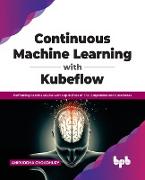- Start
- Continuous Machine Learning with Kubeflow
Continuous Machine Learning with Kubeflow
Angebote / Angebote:
An insightful journey to MLOps, DevOps, and Machine Learning in the real environment. KEY FEATURES ¿ Extensive knowledge and concept explanation of Kubernetes components with examples.¿ An all-in-one knowledge guide to train and deploy ML pipelines using Docker and Kubernetes.¿ Includes numerous MLOps projects with access to proven frameworks and the use of deep learning concepts. DESCRIPTION 'Continuous Machine Learning with Kubeflow' introduces you to the modern machine learning infrastructure, which includes Kubernetes and the Kubeflow architecture. This book will explain the fundamentals of deploying various AI/ML use cases with TensorFlow training and serving with Kubernetes and how Kubernetes can help with specific projects from start to finish.This book will help demonstrate how to use Kubeflow components, deploy them in GCP, and serve them in production using real-time data prediction. With Kubeflow KFserving, we'll look at serving techniques, build a computer vision-based user interface in streamlit, and then deploy it to the Google cloud platforms, Kubernetes and Heroku. Next, we also explore how to build Explainable AI for determining fairness and biasness with a What-if tool. Backed with various use-cases, we will learn how to put machine learning into production, including training and serving. WHAT YOU WILL LEARN¿ Get comfortable with the architecture and the orchestration of Kubernetes.¿ Learn to containerize and deploy from scratch using Docker and Google Cloud Platform.¿ Practice how to develop the Kubeflow Orchestrator pipeline for a TensorFlow model.¿ Create AWS SageMaker pipelines, right from training to deployment in production.¿ Build the TensorFlow Extended (TFX) pipeline for an NLP application using Tensorboard and TFMA.WHO THIS BOOK IS FOR This book is for MLOps, DevOps, Machine Learning Engineers, and Data Scientists who want to continuously deploy machine learning pipelines and manage them at scale using Kubernetes. The readers should have a strong background in machine learning and some knowledge of Kubernetes is required.
Folgt in ca. 10 Arbeitstagen
